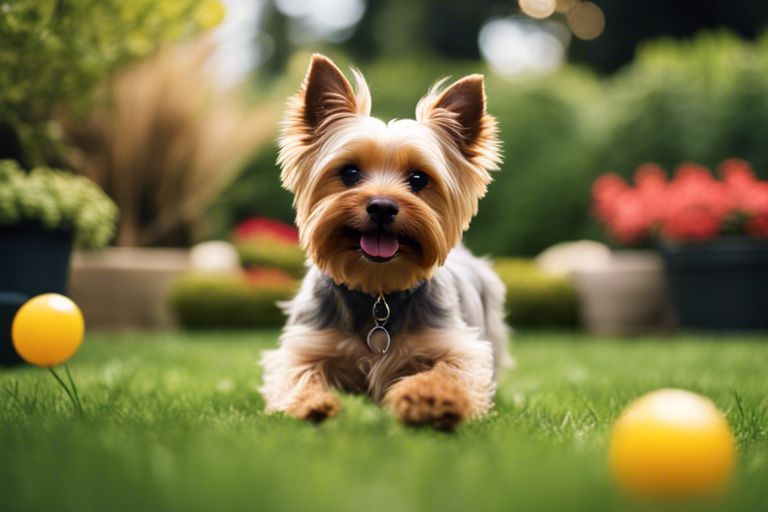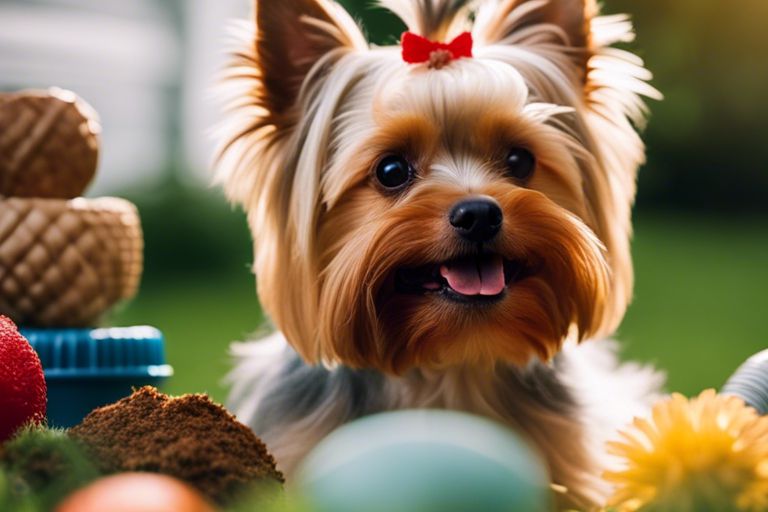Yorkshire Terriers, commonly known as Yorkies, are adorable little dogs with big personalities. To ensure your Yorkshire Terrier stays happy and healthy, it’s crucial to provide the proper care and attention they need. In this comprehensive guide, we’ll share expert tips and tricks on grooming, training, nutrition, and overall well-being to help you become the best Yorkie parent possible. From grooming techniques to training strategies, this guide has everything you need to know to keep your Yorkshire Terrier thriving and wagging their tail with joy.
Key Takeaways:
- Proper Grooming: Regular grooming, including brushing and trimming, is crucial to keep your Yorkshire Terrier’s coat healthy and tangle-free.
- Quality Nutrition: Providing a balanced diet with high-quality dog food and nutritional supplements will help maintain your Yorkie’s overall health and well-being.
- Regular Exercise: Engaging your Yorkshire Terrier in daily exercise and playtime is vital to keep them physically and mentally stimulated, preventing boredom and behavioral issues.
Types of Yorkshire Terriers: Exploring the Breed Varieties
While Yorkshire Terriers are known for their small size and big personalities, there are actually different varieties within the breed that vary in size, coat type, and color. It’s important for potential Yorkie owners to be aware of these different types so they can choose the one that best fits their lifestyle and preferences.
| 1. Traditional Yorkshire Terrier | Small in size with a silky, straight coat that is typically blue and tan. |
| 2. Parti Yorkshire Terrier | These Yorkies have a white coat mixed with black or blue colors, creating a unique and eye-catching appearance. |
| 3. Biewer Yorkshire Terrier | This variety has a white coat with blue and gold markings, originally bred from a parti-colored Yorkie. |
| 4. Teacup Yorkshire Terrier | The smallest of the breed, these Yorkies weigh less than 4 pounds and are often bred specifically for their tiny size. |
| 5. Toy Yorkshire Terrier | Slightly larger than the teacup variety, toy Yorkies are still small but may weigh up to 7 pounds. |
Recognizing Different Yorkie Sizes and Coats
Now, it’s crucial to understand that Yorkshire Terriers come in various sizes and coat types. You may encounter traditional Yorkies with silky straight coats, while others may have different colored coats like parti or Biewer variations. Understanding these differences will help you choose the right Yorkie that suits your preferences and lifestyle.
Important Breed History and Characteristics
Yorkies have a rich history dating back to the mid-19th century in England, where they were originally bred for catching rats in mines. Despite their small size, these dogs are known for their feisty and courageous personalities. They have a luxurious coat that requires regular grooming to keep it looking its best.
| Height: | 6-7 inches at the shoulder |
| Weight: | Average of 4-7 pounds |
| Coat: | Silky, straight, and hypoallergenic |
| Colors: | Blue and tan, black and gold, parti-colored, and more |
| Temperament: | Confident, affectionate, and spirited |
Step-by-Step Care for Your Yorkshire Terrier
Clearly, taking care of your Yorkshire Terrier involves a series of daily tasks that ensure your pup stays healthy, happy, and well-groomed. By following a structured routine, you can maintain your Yorkie’s overall well-being and strengthen the bond between you and your furry friend.
Daily Care Tips: Nutrition, Grooming, and Exercise
| Nutrition | Ensure your Yorkshire Terrier is fed a high-quality diet rich in protein and vital nutrients to support their overall health. |
| Grooming | Regular grooming is vital for your Yorkie, including brushing their coat, cleaning their ears, and trimming their nails. |
| Exercise | Provide daily exercise for your Yorkshire Terrier through walks, playtime, or interactive toys to keep them mentally and physically stimulated. |
- Knowing the specific nutritional needs of your Yorkie is crucial for their overall health and well-being.
Health and Wellness: Veterinary Care and Common Health Issues
Any responsible Yorkshire Terrier owner should prioritize regular veterinary check-ups to ensure their pup’s health is in top condition. Additionally, staying informed about common health issues that affect Yorkies, such as dental problems, luxating patella, and hypoglycemia, can help you address any concerns promptly.
Shiny coats and bright eyes are signs of a healthy Yorkshire Terrier. Regular visits to the vet for vaccinations, parasite control, and dental care are vital for maintaining your Yorkie’s well-being.

The Pros and Cons of Yorkshire Terrier Ownership
| Pros | Cons |
| Affectionate and loyal | High grooming maintenance |
| Great for apartment living | Potential for separation anxiety |
| Good with children and other pets | Can be prone to barking |
| Intelligent and easy to train | Fragile and delicate |
Factors to Consider Before Bringing a Yorkie Home
An important factor to consider before bringing a Yorkie home is the amount of time you can dedicate to their care. Yorkies thrive on companionship and require regular grooming and exercise. Additionally, their small size makes them more vulnerable to injuries, so you’ll need to create a safe environment for them at home.
- Time commitment for grooming and exercise
- Creating a safe environment for their small size
- Financial responsibility for vet visits and grooming
After considering these factors, you can make an informed decision about bringing a Yorkie into your home.
The Rewards of Yorkie Companionship
Financial responsibilities come with Yorkie companionship, including regular vet check-ups, grooming, high-quality food, and potential emergency medical care. However, the love and joy they bring into your life are priceless, making it a rewarding experience overall.
Pros: The companionship of a Yorkie is unmatched, they are loving, loyal, and make great emotional support animals. Their small size and adaptability to various living situations make them a versatile pet to have.
Advanced Tips and Tricks: Mastering Yorkshire Terrier Care
- Training and Behavior
- Overcoming Challenges
Training and Behavior: Essential Commands and Socialization Techniques
After mastering the basics of Yorkshire Terrier care, it’s time to focus on advanced tips and tricks to ensure your dog is happy and healthy. Training and behavior are crucial aspects of caring for your Yorkie. By teaching necessary commands like sit, stay, and come, you can establish a strong communication foundation with your pet. Socialization techniques such as exposing your Yorkie to different environments, people, and animals from an early age can help prevent behavioral issues and anxiety in the future.
Overcoming Challenges: Coping with Barking and Separation Anxiety
After training your Yorkshire Terrier, you may still encounter challenges such as excessive barking and separation anxiety. Techniques for coping with these issues include creating a consistent routine for your Yorkie, providing plenty of exercise and mental stimulation, and using positive reinforcement to address unwanted behaviors. It’s important to understand that barking and separation anxiety are common in Yorkies, but with patience and consistent training, these challenges can be overcome.
Conclusion
From above, it is clear that providing proper care for your Yorkshire Terrier is necessary for their health and happiness. By following the tips and tricks outlined in this guide, you can ensure that your furry friend receives the best possible care. From grooming and training to nutrition and exercise, every aspect of your Yorkshire Terrier’s well-being has been covered. Recall, a happy dog is a well-cared-for dog, so make sure to prioritize your Yorkshire Terrier’s needs to have a long and joyful life together.
FAQ
Q: What are the grooming requirements for Yorkshire Terriers?
A: Yorkshire Terriers have a long, silky coat that requires regular grooming to prevent matting and tangling. Daily brushing and monthly baths are necessary to keep their coat healthy and shiny. Professional grooming every 6-8 weeks is also recommended to maintain their signature look.
Q: How much exercise do Yorkshire Terriers need?
A: Despite their small size, Yorkshire Terriers are energetic dogs that require regular exercise to stay healthy and happy. Daily walks, interactive playtime, and mental stimulation activities are important to prevent boredom and behavioral issues. Aim for at least 30 minutes to 1 hour of exercise every day.
Q: What are some common health issues in Yorkshire Terriers?
A: Yorkshire Terriers are prone to certain health conditions, including dental problems, tracheal collapse, and patellar luxation. Regular veterinary check-ups, proper dental care, a balanced diet, and maintaining a healthy weight can help prevent these issues. Familiarize yourself with the breed’s health concerns to provide proactive care.

